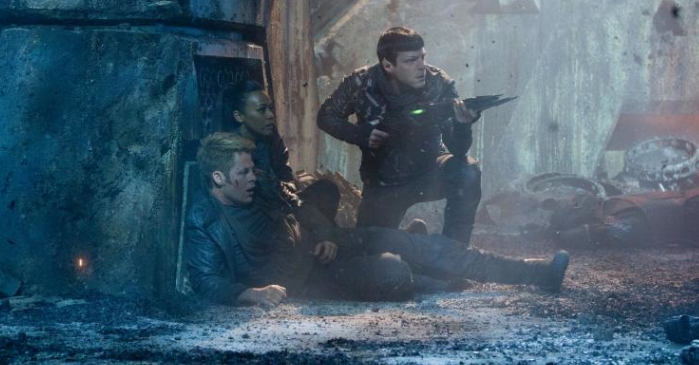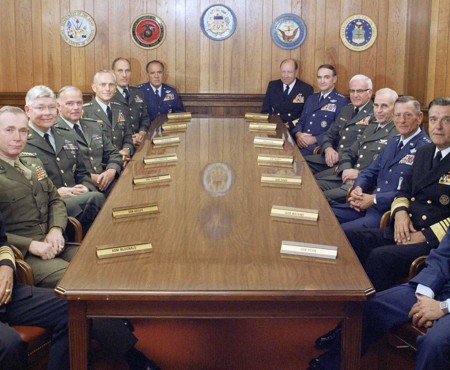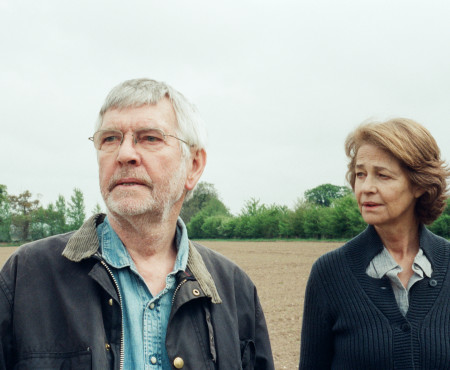As someone with only a faint knowledge of the Star Trek franchise, mostly through other bits of media and pop culture references, 2009’s Star Trek was a huge breath of fresh air. Here was a larger than life franchise with characters so iconic and ingrained in the canon, that even people like me knew who they were, and why they were so beloved, and J.J. Abrams managed to distill all of that into a perfect cocktail of blockbuster entertainment.
Paying loving homage to the series’ roots, while also establishing a new story for a new generation, it got people like me to care about Star Trek. I can’t think of a better compliment, and for better or worse, it made the series accessible to everyone. Four years later, the long awaited sequel lands, with the burden of high expectations upon its shoulders. Would Abrams capture that lightning in bottle twice?
The film hits the ground running and never once eases up on the throttle. You’d be hard pressed to find a faster-paced film in recent memory, and it’s both a blessing and a curse. It’s so relentless in its commitment to constant motion, both literal and figurative, that it can be a tad overwhelming, rarely pausing to take a moment to breathe. But when those moments do happen, they land with perfect grace.
Whereas the first film had a laser focus on Spock’s emotional arc, Into Darkness sets its sights on Kirk, and in a way, that relentless pace reflects his own point of view and lifestyle. He’s constantly in motion, hardly ever stopping to smell the roses, and that risky cowboy attitude is becoming a problem. After being thoroughly chewed out by Admiral Pike and stripped of his command for violating the Prime Directive, Pike finds him in a bar and has a heart to heart about his trust and belief in Kirk. As we know from the first film, Pike is the closest thing to a father figure Kirk has ever had, and the emotional payoff of that relationship is handled with tact and genuine feeling. It’s impressive that Abrams can make that relationship resonate, when most of it happens off-screen. It’s moments like this where the film truly shines outside of its incredible set pieces and gorgeous visual palette. Abrams chose to shoot 30 minutes of the film in IMAX format, and he makes full use of the added depth and image space.
None of those moments between characters would work if the cast didn’t have the inexplicable chemistry that this one does. Even when the script starts to get a bit silly, the actors carry it through sheer talent, dedication, and bouncing off one another. Chris Pine and Zachary Quinto are as great as ever, guiding Kirk and Spock through satisfying emotional arcs and organic character developments, and Karl Urban continues to be the scene stealer he was in the first film.
But what about Benedict Cumberbatch, in the role of our mysterious villain? Don’t get me wrong, Cumberbatch is terrific in the part. His oddly reptilian features and proto-Alan Rickman voice lend a certain quality to the role that can’t be replaced. But it’s a somewhat underwritten character, carried along primarily through sheer performance. By that same token, the script is easily the weakest element here, and not because it’s necessarily bad. The third act of the film really tries too hard to tie itself to the original mythology. Granted, the rebooted franchise takes place in an alternate universe, and events might be similar, but it’s this odd need to shackle the film to an older film (via its villain) that brings it down a peg towards the end. Whereas the 2009 entry acknowledged the old franchise, this film gets into explicit references to events from another film, and it just feels out of place and wholly unnecessary.
That said, the film is an undeniable joy. It moves along with the determination and weight of a speeding freight train, propelled along by a string of breathless set pieces. The visual grandeur on display is as impressive as ever, and the IMAX format only enhances the scale of everything. You get a sense that these starships are large, especially when set against buildings and landscapes, framed in the largest negative possible. Michael Giacchino’s score is sweeping and majestic, proving once again that he has rightfully earned his place as Hollywood’s most prolific contemporary composer outside of Hans Zimmer.
So the question remains, does Abrams capture that same magic he did back in 2009? The film should probably get the chance to age a bit before declaring one way or another. The rush to outright elevate or dismiss a film this big is tempting but unwise. For now, it’s a ceaselessly entertaining entry in a franchise that appears to have found a new lease on life.




















